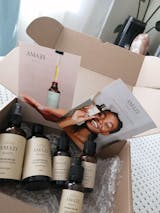“Why Beauty?” The question we’ve been asked since the inception of AMAZI. “Beauty seems so frivolous” is a common judgement we’ve come up against. We’ve always believed that beauty is an underestimated tool for economic growth. The industry creates earning opportunities for millions of women who dream of better futures just by accessing the industry. And importantly, it’s an industry supported by the historically consistent and continuously growing demand for self-care. By underestimating the power of the industry, we are losing out on the $400 billion global market that is growing at 5% yearly (CAGR).
There’s a lot of commentary about what would ignite a South African economic revival. Boosting manufacturing, supporting entrepreneurship and getting more women economically active are three points that consistently make the list of talked-about solutions. If we know that 61% of the 18 million active female shoppers in South Africa spend monthly on self-care products, why haven’t we incentivised local product innovation? Why haven’t we directed more investment toward encouraging South African women to create beauty products?
Perhaps now is the time for us to reframe how we think about the beauty industry. If we can see it as a powerful tool for socioeconomic progress, we will see that the opportunities to invest in local, women-owned talent and the potential for women to build businesses are plenty.
Our recently launched skincare line: AMAZI Beauty, is a reflection of South Africa’s local production potential, the amazing indigenous plants we have access to as South Africans and our belief that womens’ spending on self-care is a powerful tool when leveraged to fund and fuel impact.
There are two things we love doing as a team: 1) dreaming and 2) challenging the status quo. Our dream to launch an accessible, quality, South African sourced, produced and packaged product that would support AMAZI’s skills development program was born out of conversation with women.
Just after the President announced the first level 5 lockdown in March 2020, our team went into deep customer research mode. We just wanted to immerse ourselves in the minds of South African women to understand how the sudden changes to the way we live were impacting them. We hosted focus groups weekly to talk through everything from mental health to self-care.
During one of our conversations, women brought up how accessing their usual international skincare brand was becoming tricky. Online stores were selling out and couldn’t restock because product just wasn’t moving globally. At the same time, women were messaging us asking for our advice on what local products they could try and this sparked our curiosity for the South African product landscape.
We began asking women to bring their favourite beauty product to our online focus groups because we wanted to get a sense of how many women looked to international products to meet their self-care needs. The very first time we asked women to reveal their favourite products, everyone held up an international brand proudly to their cameras.
As we moved out of lockdown, women were still struggling to access international brands and at the same time the awareness and the appreciation for the quality we have locally started being celebrated. We continued asking women to bring their favourite beauty product to our online conversations and interestingly when asked to hold their product of choice up to the camera, more started showing local product and those still using international brands seemed almost embarrassed by their choice.
When we took a step back and thought about how the conversation changed, we realised our local economy had a window of opportunity that was unique. Never before have South Africans thought of local, particularly when it comes to beauty product, as credible. Our benchmark for credibility has mostly been what is created and produced internationally. This window presented the opportunity for us to change that narrative because as consumers, we were willing to see our local potential.
When we began researching manufacturers we could collaborate with, we saw the devastation COVID wreaked on an already faltering sector. When most consumers would prefer buying a product made internationally, there isn’t really a need for a strong, local production capacity so seeing consumers opening their minds to local potential has begun encouraging new activity among manufacturers. We were very clear that our product needed to be a celebration of Southern Africa. We weren’t interested in sourcing ingredients outside our borders or formulating the product somewhere cheaper. We wanted to showcase what we can make together at home when we believe in our economy and we are willing to explore what it has to offer us.
It was almost a two-year journey from the day we began dreaming to when we were able to launch our product line. Along the way, we were often offered advice for how to get to market “quicker” – mostly by compromising on our values by sourcing or producing outside of South Africa. Thankfully, we walked our journey the way we felt was important: by being patient and learning what South Africa could offer us.
Here are the 5 things we learnt about creating a local product line:
- There are South African manufacturers that want to create fully-local products. Importing raw ingredients isn’t as simple or cost-effective anymore and sustainable manufacturing will increasingly need to look at what is available locally.
- We have the most incredible plant-life. All our products use active, plant-based oils that we try not to tamper with so we don’t lose their medicinal value. Most skincare, even if produced in South Africa, likely contains imported ingredients. We wanted our ingredients to be local and so we challenged ourselves and our manufacturers to find local plants that would offer the same (if not better) benefits as imported products. If our indigenous plants thrive in our South African environments, it just made sense to us that these ingredients would help us thrive.
- Women want natural, clean, ethically produced products that are conscious about its social and environmental footprint. Women are researching what goes into the products they use and how those products are made. They know which harmful ingredients to look out for as well as production processes that are harmful. They’re demanding transparency from product makers and will increasingly hold product makers accountable to their practices.
- Women want to support local, women-owned businesses that have a purpose beyond profit. Women are community-minded. Most may not have the extra time or extra funds to donate to organisations that help other women but if you give them a convenient way to direct their funds to supporting the development of other women, they will become not just customers but advocates.
- The potential for us to impact even more women who want to gain a credible, marketable skill and work toward financial independence has been amplified by the opportunities to distribute our product beyond our walls. Our product line is an important vehicle for growing our impact agenda.
By creating an Impact-driven South African skincare line, we’re showcasing what’s possible when we look inwards to our talent, our ingredients and our capacity locally. Our hope is that many more believe in the possibility of what we can achieve on our soil.

